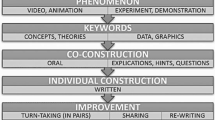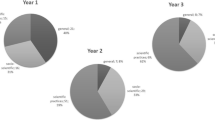Abstract
The paper introduces a tool for analyzing the teaching venue (where and how the teaching happens) of science teachers, called Strands of Science Teaching (SST). Its construction was by analogy to the Strands of science Learning, a set of categories of analysis for the science teaching. Based on the concepts of Learning by Inquiry, the aspects of Nature of Science, and the teaching practice, the new set of categories were elaborated to analyze the teacher’s views on their teaching venue. They are (1) encouraging interest in science; (2) teaching science as a set of knowledge; (3) encouraging reflection on the nature of scientific knowledge and scientific learning; (4) engaging with the community; (5) and encouraging identification with the scientific enterprise. The SST were tested in interviews with two teachers of secondary education who teaches different science subjects, and the interviews indicated different priorities in light of the strands. It was possible to observe that for the discipline about science methods, both teachers prioritize strands 1 and 4 in their practices. On the other hand, for traditional science classes, one teacher prioritizes strand 1, and the other, strands 1 and 2. The different distributions between the Strands of Science Teaching point to different views of teaching science present in each subject. It is inferred from the analysis that the Strands of Science Teaching can be understood as an instrument for describing teaching venues, from which strands are prioritized by teachers.





Similar content being viewed by others
Data Availability
The complete transcription of the interviews (in Portuguese) can be found at Portugal (2018).
Code Availability
Not applicable.
Notes
Among the encountered FoS, we point out that “The production of scientific knowledge involves curiosity, creativity and imagination”; “Scientific knowledge is temporary and provisional”; “science does not answer all questions, for its methods are limited”; “Scientific knowledge is dependent on the historical, political, social and cultural context”; “science begins from observations and uses inferences, each with specific characteristics”; “science seeks data according to theories”; among others (Azevedo & Scarpa, 2017, pp. 595-597).
The descriptors of each strands were conceived a priori and constantly reviewed throughout the analysis presented in Section 4. Here, we present its final version, already revised in light of reflections from its application and discussions carried out throughout the development of the inquiry.
This subject was introduced in some Schools in Brazil so teachers could teach more about scientific inquiry and put students into scientific projects, eventually presenting this project in science fairs.
We will call "traditional disciplines" the disciplines of science, chemistry, biology, physics, or other mandatory subjects of the formal education curriculum in Brazil, as opposed to disciplines not belonging to the given curriculum, such as scientific initiation.
The complete interviews (in Portuguese), divided into units of analysis along with the coding and the reasons for every code, can be found at Portugal (2018).
References
Alís, J. C., Pérez, D. G., & Montoro, I. F. (2001). Hacia una imagen no deformada de la actividad científica. ENDOXA, 1(14), 228–260. https://doi.org/10.5944/endoxa.14.2001.5026
American Association for the Advancement of Science (AAAS). (1993). Benchmarks for scientific literacy. Author.
American Association for the Advancement of Science (AAAS). (2001). Atlas of scientific literacy. Author.
Armstrong, M., & Boud, D. (1983). Assessing participation in discussion: An exploration of the issues. Studies in Higher Education, 8(1), 33–44. https://doi.org/10.1080/03075078312331379101
Arruda, S. de M., Passos, M. M., & Fregolente, A. (2012). Focos da Aprendizagem Docente. Alexandria, 5(3), 25–48. Retrieved March 29, 2021, from https://periodicos.ufsc.br/index.php/alexandria/article/view/37734.
Arruda, S. de M, Passos, M. M., Piza, C. A. de M., & Felix, R. A. B. (2013). O aprendizado científico no cotidiano. Ciência & Educação, 19(2), 481–498. https://doi.org/10.1590/S1516-73132013000200016.
Arruda, S. de M, Portugal, K. O., & Passos, M. M. (2018). Focos da aprendizagem: revisão, desdobramentos e perspectivas futuras. Revista de Produtos Educacionais e Pesquisas em Ensino, 2(1), 91–121. Retrieved March 29, 2021, from http://seer.uenp.edu.br/index.php/reppe/article/view/1298.
Arruda, S. de M., Zapparoli, F. V. D., & Passos, M. M. (2019). Aprendizagem de Astronomia em grupos do Facebook. Caderno Brasileiro de Ensino de Física, 36(2), 383–413. https://doi.org/10.5007/2175-7941.2019v36n2p383.
Azevedo, N. H., & Scarpa, D. L. (2017). Revisão Sistemática de Trabalhos sobre Concepções de Natureza da Ciência no Ensino de Ciências. Revista Brasileira de Pesquisa em Educação em Ciências, 17(2), 579–619. https://doi.org/10.28976/1984-2686rbpec2017172579.
Barrow, L. H. (2006). A brief history of inquiry: From Dewey to standards. Journal of Science Teacher Education, 17(3), 265–278. https://doi.org/10.1007/s10972-006-9008-5
Bardin, L. (1986). L’analyse de contenu. Presses universitaires de France.
Chevallard, Y. (1991). La Transposición Didáctica: Del saber sabio al saber enseñado. AIQUE.
Dagher, Z. R., & Erduran, S. (2016). Reconceptualizing the nature of science for science education Why Does it Matter? Science & Education., 25, 147–164. https://doi.org/10.1007/s11191-015-9800-8
Darroz, L. M., & Wannmacher, C. M. D. (2015). Aprendizagem docente no âmbito do PIBID/Física: a visão dos bolsistas de iniciação à docência. Ensaio, 17(3), 727–748. https://doi.org/10.1590/1983-21172015170309
Demo, P. (1997). Educar pela pesquisa (2nd ed.). Autores Associados.
Department for Education of England. (2012). The national curriculum in England: Key stages 3 and 4 framework document, December, 2014. London, UK: Author. Retrieved June 15, 2020, from https://dera.ioe.ac.uk/20510/1/SECONDARY_national_curriculum_FINAL_140714.pdf.
European Commission Communication. (2001). Making a European area of lifelong learning a reality. Retrieved Accessed 15 June 2020, from http://aei.pitt.edu/42878/.
Falk, J. H. (2005). Free-choice environmental learning: Framing the discussion. Environmental Education Research, 11(3), 265–280. https://doi.org/10.1080/13504620500081129
Falk, J. H., & Dierking, L. D. (2002). Lessons without limit: How free-choice learning is transforming education. AltaMira Press.
Fejolo, T. B., Arruda, S. de M., & Passos, M. M. (2013). Aprendizagem científica informal no PIBID: identificando e interpretando os focos da aprendizagem científica. Caderno Brasileiro de Ensino de Física, 30(3), 628–649. https://doi.org/10.5007/2175-7941.2013v30n3p628.
Filgueira, S. S., & da Silva, L. M. (2017). Os focos da aprendizagem científica: em busca de evidências da aprendizagem em uma atividade lúdica. Revista Eletrônica Ludus Scientiae, 1(1), 16–25. https://doi.org/10.30691/relus.v1i1.725
Flick, L., & Lederman, N. G. (2006). Scientific inquiry and nature of science: Implications for teaching, learning, and teacher education. Springer.
Gauthier, C., & Tardif, M. (1996). La pédagogie/Théorie et pratiques de l’Antiquité à nos jours. Gaetan Morin.
Glynn, S. M., & Muth, K. D. (1994). Reading and writing to learn science: Achieving scientific literacy. Journal of Research in Science Teaching, 31(9), 1057–1073. https://doi.org/10.1002/tea.3660310915
Hazen, R. M., & Trefil, J. (2009). Science matters: Achieving scientific literacy. Anchor Books.
Hirst, P. H. (1971). What is teaching? Journal of Curriculum Studies, 3(1), 5–18. https://doi.org/10.1080/0022027710030102
Houssaye, J. (2000). Le triangle pédagogique (3rd ed.). Peter Lang.
Kurutz, L. S., & Fortes, F. (2015) Contribuição do Programa Institucional de Bolsas de Iniciação à Docência do curso de Ciências Biológicas na formação acadêmica e profissional dos bolsistas participantes. Ensino & Pesquisa, 13(1), 42–62. Retrieved November 09, 2020, from http://periodicos.unespar.edu.br/index.php/ensinoepesquisa/article/view/575.
Laugksch, R. C. (2000). Scientific literacy: A conceptual overview. Science education, 84(1), 71–94. https://doi.org/10.1002/(SICI)1098-237X(200001)84:1%3C71::AID-SCE6%3E3.0.CO;2-C
Lederman, J. S., Lederman, N. G., Bartos, S. A., Bartels, S. L., Meyer, A. A., & Schwartz, R. S. (2014). Meaningful assessment of learners’ understandings about scientific inquiry—The views about scientific inquiry (VASI) questionnaire. Journal of Research in Science Teaching, 51(1), 65–83. https://doi.org/10.1002/tea.21125
Lederman, N. G. (2004). Syntax of nature of science within inquiry and science instruction. In Flick, L. B., & Lederman, N. G. (Eds.). Scientific inquiry and nature of science (pp. 301–317). Springer. https://doi.org/10.1007/978-1-4020-5814-1_14.
Lederman, N. G., Abd-El-Khalick, F., Bell, R. L., & Schwartz, R. S. (2002). Views of nature of science questionnaire: Towards valid and meaningful assessment of learners’ conceptions of the nature of science. Journal of Research in Science Teaching, 39(6), 497–521. https://doi.org/10.1002/tea.10034
Marandino, M. (Ed.). (2008). Educação em museus: a mediação em foco. São Paulo: Geenf/FEUSP. Retrieved June 15, 2020, from http://www.geenf.fe.usp.br/v2/?p=542.
Massoni, N. T., & Moreira, M. A. (2014). Uma análise cruzada de três estudos de caso com professores de Física: a influência de concepções sobre a natureza da ciência nas práticas didáticas. Ciência & Educação, 20(3), 595–616. https://doi.org/10.1590/1516-73132014000300006
Matthews, M. R. (2012). Changing the focus: From nature of science (NOS) to features of science (FOS). In: Khine, M. S. (Ed.). Advances in nature of science research (pp. 3–26). Springer. https://doi.org/10.1007/978-94-007-2457-0_1.
Mayring, P. (2014). Qualitative content analysis: Theoretical foundation, basic procedures and software solution. Klagenfurt. Retrieved November 15, 2020, from https://nbn-resolving.org/urn:nbn:de:0168-ssoar-395173.
McCormick, C. B. (2003). Metacognition and learning. In: Reynolds, W. M. & Miller, G. E. (Eds.), Handbook of psychology. v.7: Educational psychology (79–102). Wiley. https://doi.org/10.1002/0471264385.wei0705.
McCormick, C. B., Dimmitt, C., & Sullivan, F. R. (2012). Metacognition, learning, and instruction. In I. B. Weiner, W. M. Reynolds, & G. E. Miller (Eds.), Handbook of psychology, volume 7: Educational Psychology (2nd ed., pp. 69–98). Wiley. https://doi.org/10.1002/9781118133880.hop207004.
Meirieu, P. (1987). Apprendre, oui... mais comment. ESF.
Ministry of Education (MEC) of Brazil. (2018). Base Nacional Comum Curricular. Brasília: MEC. Retrieved June 15, 2020, from http://basenacionalcomum.mec.gov.br/images/BNCC_EI_EF_110518_versaofinal_site.pdf.
Moraes, R. (1999). Análise de conteúdo. Educação, 22(37), 7–32. Retrieved June 15, 2020, from http://cliente.argo.com.br/~mgos/analise_de_conteudo_moraes.html.
National Research Council (NRC). (2005). How students learn: Science in the classroom. The National Academic Press. https://doi.org/10.17226/11102.
National Research Council (NRC). (2009). Learning science in informal environments: People, places, and pursuits. The National Academic Press. https://doi.org/10.17226/12190.
National Research Council (NRC). (2007). Taking science to school: Learning and teaching science in grades K-8. The National Academic Press. https://doi.org/10.17226/11625
National Research Council (NRC). (2012). A framework for K-12 science education: Practices, crosscutting concepts, and core ideas. The National Academic Press. https://doi.org/10.17226/13165
OECD. (2019). PISA 2018 assessment and analytical framework. PISA, OECD Publishing. https://doi.org/10.1787/b25efab8-en
Pedro, C. L., Passos, M. M., & Arruda, S. de M. (2015). Aprendizagem científica no Facebook. Alexandria, 8(1), 3–19. https://doi.org/10.5007/1982-5153.2015v8n1p3.
Portugal, K. O. (2018). Os Focos do Ensino Científico: Um instrumento para analisar o Ensino de Ciências [Doctoral thesis, Universidade de Londrina]. Retrieved March 29, 2021, from http://www.bibliotecadigital.uel.br/document/?code=vtls000219567.
Roberts, D. A. (2013). Scientific literacy/science literacy. In: Lederman, N. G., & Abell, S. K. Handbook of research on science education (743–794). Routledge. https://doi.org/10.4324/9780203824696
Rönnebeck, S., Bernholt, S., & Ropohl, M. (2016). Searching for a common ground–A literature review of empirical research on scientific inquiry activities. Studies in Science Education, 52(2), 161–197. https://doi.org/10.1080/03057267.2016.1206351
Sasseron, L. H. (2015). Alfabetização Científica, Ensino por Investigação e Argumentação: Relações entre Ciências da Natureza e escola. Ensaio Pesquisa em Educação em Ciências, 17(Special Issue), 49–67. https://doi.org/10.1590/1983-2117201517s04.
Sedano, L., & de Carvalho, A. M. P. (2017). Ensino de ciências por investigação: oportunidades de interação social e sua importância para a construção da autonomia moral. Alexandria, 10(1), 199–220. https://doi.org/10.5007/1982-5153.2017v10n1p199
Tardif, M. (2002). Saberes docentes e formação profissional. Vozes.
Turiman, P., Omar, J., Daud, A. M., & Osman, K. (2012). Fostering the 21st century skills through scientific literacy and science process skills. Procedia - Social and Behavioral Sciences, 59, 110–116. https://doi.org/10.1016/j.sbspro.2012.09.253
Vicentin, F. R., Passos, M. M., Arruda, S. de M., & Passos, A. M. (2018). Focos da aprendizagem do professor pesquisador. Revista Brasileira de Ensino de Ciência e Tecnologia, 13(1), p. 54–78, 2020. Retrieved March 29, 2021, from https://periodicos.utfpr.edu.br/rbect/article/view/8869.
Zabala, A. (1998). A prática educativa: como ensinar. ArtMed.
Author information
Authors and Affiliations
Contributions
• Khalil Oliveira Portugal: conceptualization, methodology, investigation, writing—original draft, and visualization.
• Sergio de Mello Arruda: conceptualization, data curation, supervision, and project administration.
• Marinez Meneghello Passos: validation and writing—review and editing.
Corresponding author
Ethics declarations
Conflict of Interest
The authors declare that they have no conflict of interest.
Additional information
Publisher’s Note
Springer Nature remains neutral with regard to jurisdictional claims in published maps and institutional affiliations.
Rights and permissions
About this article
Cite this article
Portugal, K.O., Arruda, S.d. & Passos, M.M. Strands of Science Teaching. Sci & Educ 31, 149–171 (2022). https://doi.org/10.1007/s11191-021-00213-2
Accepted:
Published:
Issue Date:
DOI: https://doi.org/10.1007/s11191-021-00213-2




